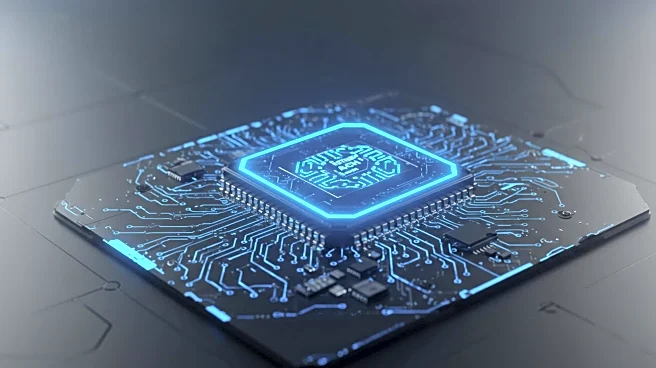What's Happening?
Nvidia is currently in discussions with the U.S. government regarding the potential export of a new, more advanced artificial intelligence chip to China. CEO Jensen Huang revealed that the company is developing the B30A chip, which is intended to be more powerful than the H20 chip, the only semiconductor Nvidia is currently permitted to sell in China. The U.S. government has expressed concerns over the possibility of advanced American chips being utilized in Chinese military applications. Nvidia's position in China has been challenging, as the company had previously developed the H20 chip specifically for the Chinese market, which faced export restrictions earlier this year. Nvidia has since been allowed to sell the H20 chip again, but must allocate 15% of its China chip sales to the U.S. government in exchange for export licenses.
Why It's Important?
The negotiations between Nvidia and the U.S. government are significant as they highlight the ongoing tension between technological advancement and national security concerns. The ability to export more advanced chips to China could have substantial implications for Nvidia's business operations and revenue, given China's large market for AI technology. However, the U.S. government's apprehensions about the potential military applications of these chips underscore the delicate balance between economic interests and security priorities. The outcome of these talks could influence future U.S. policy on technology exports and impact the global semiconductor industry, particularly in terms of competition and innovation.
What's Next?
The next steps involve continued dialogue between Nvidia and the U.S. government to determine whether the B30A chip can be exported to China. The decision will likely depend on assessments of the chip's capabilities and potential security risks. If approved, Nvidia may need to navigate further regulatory hurdles and address concerns raised by Chinese authorities regarding security vulnerabilities in its products. The resolution of these issues will be crucial for Nvidia's strategic positioning in the Chinese market and could set precedents for other tech companies facing similar export challenges.
Beyond the Headlines
The situation with Nvidia also raises broader questions about the ethical and legal dimensions of technology exports. The potential for advanced chips to be used in military applications poses ethical dilemmas about the role of tech companies in global security. Additionally, the legal frameworks governing technology exports may need to evolve to address the rapid pace of innovation and the geopolitical implications of tech advancements. This case could prompt discussions on international cooperation and regulation in the tech industry.










